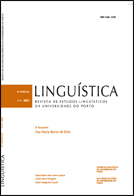Some notes on outro in Portuguese
Abstract
This paper studies the syntactic behavior of outro(s) in Brazilian and European Portuguese. Starting from the syntax of its Italian counterpart un altro/(degli) altri, we argue that outro(s) in prenominal position is neither an adjective nor a determiner, but an existential quantifier and that the presence of the indefinite article, um outro/uns outros, gives rise to a complex existential quantifier, like the corresponding Italian form. We also argue that outro(s) and um outro/uns outros do not specialize for different interpretations since they both substantially show the same ambiguity (one/some more or a/some different one(s)) and behave in the same way in relation to possible semantic interpretations typical of existential quantifiers.
References
Biberawer, T. & Roberts, I. 2012. Towards a parameter hierarchy for auxiliaries: diachronic considerations. Cambridge Occasional Papers in Linguistics, 6: 267-294, https://www.mmll.cam.ac.uk/files/copil_6_9_biberauerroberts.pdf.
Brugè, L. 2018. Otro: Consideraciones a favor de su no inclusión en la categoría Determinante. Borealis, 7/2: 109-134. https://septentrio.uit.no/index.php/borealis/article/view/4582
Brugè, L. & Brugger, G. 1996. On the accusative a in Spanish. Probus 8: 1-51.
Cardinaletti, A. & Giusti, G. 2006. The syntax of quantified expressions and quantitative clitics. In Martin Everaert & Henk van Riemsdijk (eds.) The Blackwell Companion to Syntax, vol 5. Oxford: Blackwell, 23-94.
Cardinaletti, A. & Giusti, G. 2016. The syntax of the Italian indefinite determiner dei. Lingua 181: 58-80.
Cardinaletti, A. & Giusti, G. 2017. Quantified expressions and quantitative clitics. In Martin Everaert & Henk van Riemsdijk (eds.) The Wiley Blackwell Companion to Syntax, Second Edition, Wiley online library, DOI:10.1002/9781118358733 (1-42).
Cardinaletti, A. & Giusti, G. 2018. Indefinite determiners, variation and optionality in Italo-Romance. In Roberta D’Alessandro and Diego Pescarini (eds.) Advances in Italian Dialectology, Sketches of Romance Grammars vol 1. Amsterdam: Brill, 135-161.
Cardinaletti, A. & Giusti, G. 2020. Indefinite determiners in informal Italian. A preliminary approach. Linguistics 58.3: 679-712.
Cinque, G. 2015. A note on ‘other’. In Guglielmo Cinque (ed.) Charting the Landscape of Linguistics. Webschrift for Josef Bayer. Konstanz: Universität Konstanz, 22-27.
Chierchia, G. 1997. Partitives, reference to kinds and semantic variation. In: Aaron L. (ed.) Proceedings of Semantics And Linguistic Theory, Volume VII, Ithaca, NY. Cornell University: CLC Publications, 73-98.
Di Caro, V. & Giusti, G. 2015. A protocol for the Inflected Construction in Sicilian Dialects. Annali di Ca’ Foscari Serie Occidentale 49: 293-322. Enç, M. 1991. The semantics of specificity. Linguistic Inquiry 22: 1-26.
Farkas, D. 2002. Specificity distinctions. Journal of Semantics 19: 1-31.
Farkas, D. & Brasoveanu, A. 2013. “A Typology of Specificity”. Revue Roumaine de Linguistique 58.4: 355-369.
Fodor, D. & Sag, I. 1982. “Referential and quantificational indefinites”. Linguistics and Philosophy 5: 355-398.
Giusti, G. 1993. La sintassi dei determinanti. Padova, Unipress.
Giusti, G. 2011. Structural Protocols for linguistic awareness enhancing language identity. Research project at CRASSH, University of Cambridge, October-December 2011. http://www.crassh.cam.ac.uk/people/profile/giuliana-giusti
Giusti, G. 2021. A protocol for indefinite determiners in Italo-Romance. In Tabea Ihsane (ed.) Disentangling Bare Nouns and Nominal Introduced by a Partitive Article, Syntax and Semantics vol. 43 Leiden: Brill, 262-300.
Giusti, Giuliana. (to appear). “Partitivity in Italian. A protocol approach to a multifaceted phenomenon”. In: Giuliana Giusti and Petra Sleeman (eds.) Partitive determiners, partitive pronouns and partitive Case. Berlin, De Gruyter.
Giusti, G. & Zegrean, L. 2015. “Syntactic Protocols to enhance inclusive cultural identity. A case study on Istro-Romanian clausal structure”. Quaderni di Linguistica e Studi Orientali 1: 117-138.
Hellan, L. 1981. “On Semantic Scope”. In Frank Heny (ed.) Ambiguities in Intensional Contexts. Reidel, Dordrecht, 47-81.
Keenan, E. L. 1987. A semantic definition of “indefinite NP. In Eric J. Reuland and Alice G. B. ter Meulen (eds.) The Representation of (In)definiteness. Cambridge, MA: MIT Press, 286-317.
Kripke, S. 1977. Speaker’s reference and semantic reference. In Peter A. French, Theodore E. Uehling Jr and Howard K. Wettstein, (eds.) Midwest Studies in Philosophy vol. II: Studies in the philosophy of language. Morris, MN, University of Minnesota, 255-276.
Leonetti, M. 2012. Indefiniteness and Specificity. In José Ignacio Hualde, Antxon Olarrea and Erin O’Rourke (eds.) The Handbook of Hispanic Linguistics. Hoboken NJ, Wiley-Blackwell, 285-305.
Milsark, G. 1974. Existential sentences in English. Unpublished Ph.D. dissertation. MIT, Cambridge.
Neale, S. 1990. Descriptions. Cambridge MA: MIT Press.
Pesetsky, D. 1987. Wh-in-situ: Movement and unselective binding. In Eric J. Reuland and Alice G. B. ter Meulen (eds.) The Representation of (In)definiteness. Cambridge, MA: MIT Press, 98-129.
Quine, W. van Orman. 1956. Quantifiers and propositional attitudes. Journal of Philosophy 53. (Reprinted in W. Quine, The ways of paradox, 185-196). Harvard University Press, 1976.
Rivero, M. 1975. Referential properties of Spanish noun phrases. Language 51: 32-48. Revised Spanish version: Referencia y especificidad, in Estudios de gramática generativa del español, (pp. 123-158). Madrid: Cátedra, 1978.
Vilela, Mário. 1995. Gramática da língua portuguesa. Coimbra, Almedina.
Zamparelli, R. 2008. Dei ex-machina: a note on plural/mass indefinite determiners. Studia Linguistica 63.3: 301-327.
Downloads
Published
Issue
Section
License
Copyright (c) 2021 Linguística: Revista de Estudos Linguísticos da Universidade do Porto

This work is licensed under a Creative Commons Attribution-NonCommercial 4.0 International License.



